
The Good Neighbor policy was the foreign policy of the administration of United States President Franklin D. Roosevelt towards Latin America. Although the policy was implemented by the Roosevelt administration, President Woodrow Wilson had previously used the term, but subsequently went on to justify U.S. involvement in the Mexican Revolution and occupation of Haiti. Senator Henry Clay had coined the term Good Neighbor in the previous century. President Herbert Hoover turned against interventionism and developed policies that Roosevelt perfected.
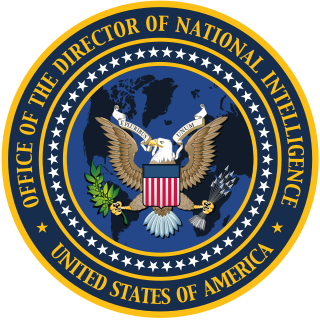
The director of national intelligence (DNI) is a senior cabinet-level United States government official, required by the Intelligence Reform and Terrorism Prevention Act of 2004 to serve as executive head of the United States Intelligence Community (IC) and to direct and oversee the National Intelligence Program (NIP). All 18 IC agencies, including the Central Intelligence Agency (CIA), the Defense Intelligence Agency (DIA) and the National Security Agency (NSA), report directly to the DNI.

William Oliver Studeman is a retired admiral of the United States Navy and former deputy director of the Central Intelligence Agency, with two extended periods as acting Director of Central Intelligence. As deputy director of Central Intelligence, he served in the administrations of George H. W. Bush and Bill Clinton under three directors of Central Intelligence, Robert Gates, R. James Woolsey Jr., and John M. Deutch. Studeman retired from the navy in 1995 after almost 35 years of service. Between 1988 and 1992 he was director of the National Security Agency; he was the Director of Naval Intelligence, from September 1985 to July 1988.

The United States Intelligence Community (IC) is a group of separate U.S. federal government intelligence agencies and subordinate organizations that work both separately and collectively to conduct intelligence activities which support the foreign policy and national security interests of the United States. Member organizations of the IC include intelligence agencies, military intelligence, and civilian intelligence and analysis offices within federal executive departments.

William Hedgcock Webster is an American retired attorney and jurist who most recently served as chair of the Homeland Security Advisory Council from 2005 until 2020. He was a United States district judge of the United States District Court for the Eastern District of Missouri and a United States circuit judge of the United States Court of Appeals for the Eighth Circuit before becoming director of the Federal Bureau of Investigation (FBI) from 1978 to 1987 and director of Central Intelligence (CIA) from 1987 to 1991. He is the only person to have held both positions.
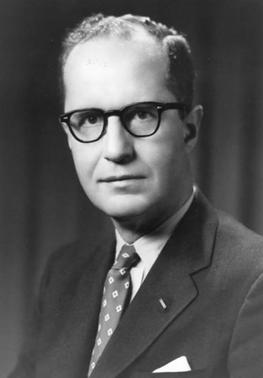
Kermit "Kim" Roosevelt Jr. was an American intelligence officer who served in the Office of Strategic Services during and following World War II. A grandson of Theodore Roosevelt, the 26th President of the United States, Roosevelt went on to establish American Friends of the Middle East and then played a lead role in the CIA's efforts to overthrow Mohammad Mosaddegh, the democratically elected Majlis-appointed prime minister of Iran, in August 1953.
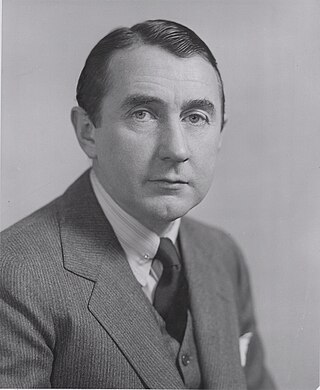
William Harding Jackson was a U.S. civilian administrator, New York lawyer, and investment banker who served as Deputy Director of the Central Intelligence Agency. Jackson also served briefly under President Dwight D. Eisenhower as Acting United States National Security Advisor from 1956 to 1957.

The National Intelligence Distinguished Service Medal (NIDSM) is a decoration awarded for service to the United States Intelligence Community. The decoration is awarded to any member or contributor to the National Intelligence Community, either civilian or military, who distinguishes themselves by meritorious actions to the betterment of national security in the United States of America, through sustained and selfless service of the highest order.

The director of the Central Intelligence Agency (D/CIA) is a statutory office that functions as the head of the Central Intelligence Agency, which in turn is a part of the United States Intelligence Community.
The United States military inter-service awards and decorations are those medals and ribbons which may be awarded to all members of the six military branches of the U.S. Armed Forces. Each military department awards inter-service awards under the same criteria.
Awards and decorations of the United States government are civilian awards of the U.S. federal government which are typically issued for sustained meritorious service, in a civilian capacity, while serving in the U.S. federal government. Certain U.S. government awards may also be issued to military personnel of the United States Armed Forces and be worn in conjunction with awards and decorations of the United States military. In order of precedence, those U.S. non-military awards and decorations authorized for wear are worn after U.S. military personal decorations and unit awards and before U.S. military campaign and service awards.

The National Counterterrorism Center (NCTC) is a United States government organization responsible for national and international counterterrorism efforts. It is based in Liberty Crossing in McLean, Virginia. NCTC advises the United States on terrorism.
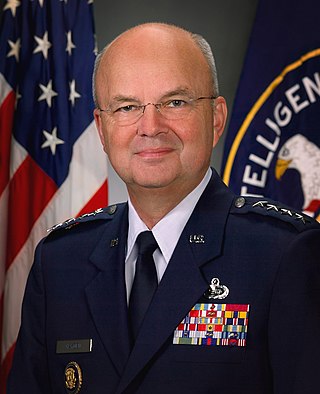
Michael Vincent Hayden is a retired United States Air Force four-star general and former Director of the National Security Agency, Principal Deputy Director of National Intelligence, and Director of the Central Intelligence Agency. He currently serves as a visiting professor at the George Mason University – Schar School of Policy and Government and co-chairs the Bipartisan Policy Center's Electric Grid Cyber Security Initiative.
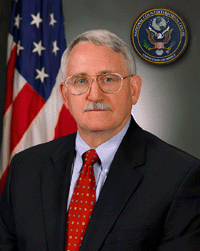
John Scott Redd is a retired vice admiral of the United States Navy, and afterward the first Senate-confirmed Director of the National Counterterrorism Center, serving from 2005 until 2007. According to David Martin at the CBS Evening News, "Scott Redd may be the most important person you've never heard of." J.J. Green at Federal News Radio referred to Redd as "the man that I often call "E.F. Hutton". He is also the past President of the Naval Academy Class of 1966 and has served on the advisory boards of several non-profit organizations. An avid amateur radio operator, Redd has won twelve world championships and nine national championships.
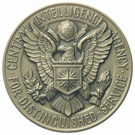
The Distinguished Intelligence Medal is awarded by the U.S. Central Intelligence Agency for performance of outstanding services or for achievement of a distinctly exceptional nature in a duty or responsibility.
The Public Interest Declassification Board (PIDB) is an advisory committee established by the United States Congress with the official mandate of promoting the fullest possible public access to a thorough, accurate, and reliable documentary record of significant U.S. national security decisions and activities. The Board is composed of nine individuals: five appointed by the President of the United States and one each appointed by the Speaker of the House, House Minority Leader, Senate Majority Leader, and Senate Minority Leader. Appointees must be U.S. citizens preeminent in the fields of history, national security, foreign policy, intelligence policy, social science, law, or archives.
The Dulles–Jackson–Correa Report was one of the most influential evaluations of the functioning of the United States Intelligence Community, and in particular, the Central Intelligence Agency (CIA). The report focused primarily on the coordination and organization of the CIA and offered suggestions that refined the US intelligence effort in the early stages of the Cold War.
The Intelligence Medal of Merit is awarded by the Central Intelligence Agency for performance of especially meritorious service or for achievement conspicuously above normal duties.
The Central Intelligence Agency (CIA) is a United States intelligence agency that "provides objective intelligence on foreign countries." The CIA is also informally known as the Agency, or historically informally referred to simply as "the Company". The CIA is part of the United States Intelligence Community, is organized into numerous divisions. The divisions include directors, deputy directors, and offices. The CIA board is made up of five distinct entitles called Directorates. The CIA is overseen by the Director of Central Intelligence. Under the Director of Central Intelligence is the Deputy Director of Central Intelligence. Under this the CIA is divided into four directorates. These directorates are as follows:

Brett Michael Holmgren is an American intelligence official who served as assistant secretary of state for intelligence and research in the Biden administration. He currently serves as the acting director for the National Counterterrorism Center.














